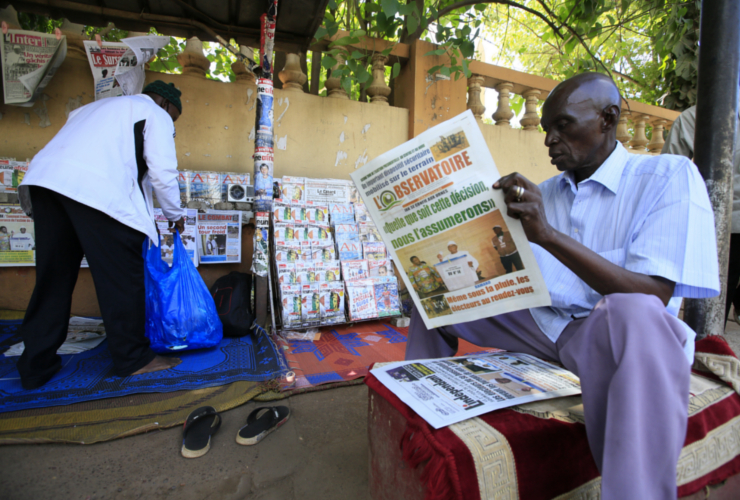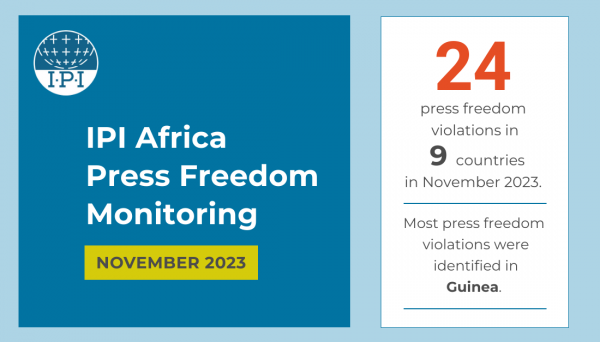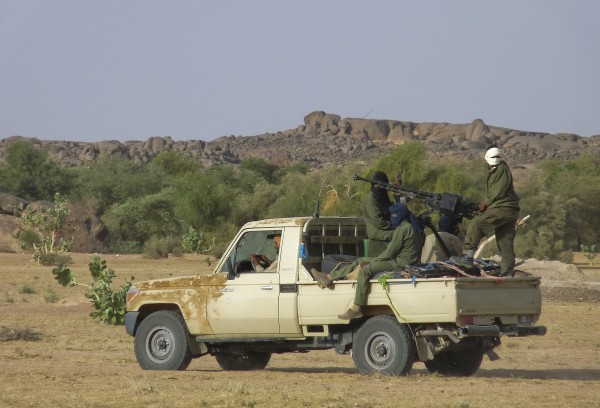Six years after a military coup, journalists in Mali continue to suffer from insecurity, attacks and unstable working conditions. President Ibrahim Boubacar Keïta, who took office in 2013 and began his second term this month, has so far failed to restore what had once been a relatively healthy and vibrant media environment.
The press freedom situation in Mali deteriorated significantly in 2012 when the country witnessed an uprising of Tuareg separatists and Islamic extremist groups in the northern Azawad region. Unhappy with the government’s response to the uprising, a group of soldiers ousted President Amadou Toumani Touré. During the height of the conflict, numerous journalists were detained and threatened, and several radio stations were forced off the air.
Today, the conflict in northern Mali continues – as do attacks on journalists and press freedom.
“Journalism has become a dangerous profession in Mali”, Mahamadou Talata Maïga, director general of the Malian journalist association Maison de la presse, said in an interview with the International Press Institute (IPI). The conflict, he said, has made journalists in northern and central Mali turn to self-censorship.
According to Maïga, at least three journalists have been murdered in Mali since the turmoil of 2012. In 2013, an armed group kidnapped and killed two Radio France Internationale journalists, Ghislaine Dupont and Claude Verlon, in the northeastern part of the country. Two years later, Radio Tahint journalist Joel Dicko was shot dead by an unidentified gunman in Timbuktu. Their assailants remain unpunished. Another journalist, Birama Touré of the newspaper The Sphinx, went missing in February 2016. In 2017, Madou Kanté, a chronicler and YouTube activist critical of the government, survived after being shot in the chest. His attackers are still at large.
Journalists have also suffered harassment and violence at the hands of state security forces, with four such attacks reportedly coming this year alone.
In February, three journalists with the news site MaliActu.net, Salif Diarra, Aliou Hasseye and Issa Coulibaly, were picked up by armed civil policemen from their newsroom over alleged blackmailing of a mayor. The journalists spent two nights in detention, and the charges were later dismissed.
In April, Pretoire newspaper journalist Mahamadou Sacko was assaulted by the police while filming the demolition of a garage. Later that month, Radio Kledu reporter Doumba Dembele was attacked by presidential guards while covering the inauguration of a highway interchange.
The most recent incident took place in June as security forces used both tear gas and physical violence on numerous journalists covering an opposition and civil society march.
Maïga told IPI that several journalists have also been sent to prison for up to six months for defamation.
“The legislation regulating media is not up-to-date and is used to sentence journalists”, he said.
He added that La Maison de la Presse du Mali has sought to tackle the threat to journalist safety by building a system to record and report attacks against journalists and by developing methods to protect journalists’ physical and psychological well-being.
Journalists questioned ahead of election
In July, Malians headed for the polls in the second presidential election since 2012. The tense atmosphere could be felt by foreign journalists seeking to cover the vote. A group of five journalists working with France’s TV5 were detained and questioned upon arrival in the country ahead of the first round of voting in July. IPI also received reports of foreign journalists who had their visas cancelled ahead of the election, leaving them unable to enter the country.
President Keïta was ultimately re-elected in August after the second round of voting, amidst attacks at polling stations carried out by suspected Islamist gunmen.
Keïta’s first term was met with high hopes of restoring stability and democracy to the country. But the conflict in the north continues, with French troops and U.N. peacekeepers holding control over the area. In recent months, clashes among different ethnic groups have spread to the previously peaceful centre of the country.
In his inauguration speech at the beginning of September, Keïta promised to revive the implementation of the 2015 peace deal. The country is now preparing for parliamentary elections scheduled for October 28.
Social media blockages a growing problem
Sory Kondo, a video journalist with the news website Sahelien.com, has spent his entire career working under the precarious, post-coup security conditions. Kondo reports on politics, society, security, immigration and culture for the site, which covers Mali, Niger and Burkina Faso.
In such perilous times for journalists, Kondo says he has thus far managed to avoid threats or attacks.
“My aim is to stick to the facts, and to remain impartial”, he told IPI.
Kondo highlighted additional challenges for the media beyond security concerns.
Authorities have blocked social media at least three times within the last two years, including for several days during the first round of the presidential election in July.
“To keep media from sharing information this way is simply unacceptable”, Kondo said.
Another concern is the weak financial situation of some media companies. Many privately owned newspapers are dependent on state subsidies.
“Almost all newsrooms operate in unstable circumstances: Their equipment is outdated, salaries remain unpaid and they are not able to provide social security”, Maïga said.
He added that many young journalists in particular had abandoned their career in journalism in hope of finding more stable income elsewhere.
Kondo said that a lack of professional training also contributed to the fraying of the media environment.
“If these passionate young people were given the opportunity to get information and training, they could take part in making the Malian press environment more professional.”



